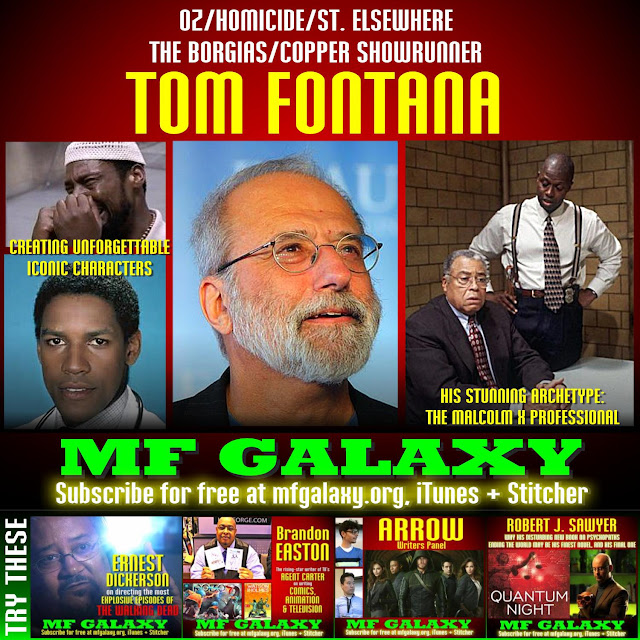TOM FONTANA, SHOWRUNNER SUPREME OF OZ, HOMICIDE, THE BORGIAS + ST. ELSEWHERE ON CREATING ICONIC, UNFORGETTABLE CHARACTERS WHILE “COLOURISING” US TELEVISION (MF GALAXY 072)
MULTIPLE AWARD-WINNING TV WRITER ON SOCIAL REALISM, CHALLENGING VIEWERS + HIMSELF THROUGH DRAMA, AND HIS ARCHETYPE OF THE “MALCOLM X PROFESSIONAL”
Tom Fontana is the writer/producer and/or showrunner on St. Elsewhere, Homicide: Life on the Street, Oz, Copper, The Jury, The Beat, The Bedford Diaries, and The Borgias.
LISTEN/DOWNLOAD
He’s also one American television’s most celebrated writers. He’s received the Cable Ace Award, the Humanitas Prize, an Edgar Award, the Austin Film Festival’s Outstanding Television Writer Award, first prize at Switzerland’s Cinéma Tout Ecran Festival, three Emmys, three awards from the Writers' Guild, four from the Television Critics Association, and four Peabodys. And all this, if his website is to be believed, without using a single computer--Fontana claims to write longhand on yellow legal paper.
Long before HBO’s The Wire took all the credit for long-form, serial innovation in US television addressing racism and oppression in the United States, there was the work of Tom Fontana. Long before Denzel Washington was an A-list money-magnet, he was guided by Fontana’s pen as Dr. Philip Chandler on the acclaimed St. Elsewhere. Andre Braugher was frequently lauded as the finest actor on US television for his work as Detective Frank Pembleton on the Fontana-driven Homicide. Oz showcased Eamonn Walker as Muslim Minister Kareem Said, Adewale Akinnouye-Agbaje as Simon Adebisi, Harold Perrineau as Augustus Hill, Ernie Hudson as Warden Leo Glynn, and muMs da Schemer as Poet.
In other words, Tom Fontana, a Euro-American writer, has created some of the very best African-American, Nigerian, and Muslim characters—and in the last two cases, some of the only ones—on US television. He also created an archetype we’ll hear about later in the show: what I call “the Malcolm X Professional.”
Tom Fontana spoke with me via telephone from his office in New York at the end of March 2003, shortly after the US Academy Awards and during the illegal US invasion of Iraq, events that arise during our conversation, and which include Ari Fleischer, then a spokesman for US President George W. Bush, and Bowling for Columbine director Michael Moore who’d then just made a speech critical of Bush at the Academy Awards. Our conversation focuses on Fontana’s strategy for creating such iconic and dynamic characters.
LISTEN/DOWNLOAD
SUBSCRIBE FOR FREE ON iTUNES
SUBSCRIBE FOR FREE ON STITCHER
Tom Fontana is the writer/producer and/or showrunner on St. Elsewhere, Homicide: Life on the Street, Oz, Copper, The Jury, The Beat, The Bedford Diaries, and The Borgias.
LISTEN/DOWNLOAD
He’s also one American television’s most celebrated writers. He’s received the Cable Ace Award, the Humanitas Prize, an Edgar Award, the Austin Film Festival’s Outstanding Television Writer Award, first prize at Switzerland’s Cinéma Tout Ecran Festival, three Emmys, three awards from the Writers' Guild, four from the Television Critics Association, and four Peabodys. And all this, if his website is to be believed, without using a single computer--Fontana claims to write longhand on yellow legal paper.
Long before HBO’s The Wire took all the credit for long-form, serial innovation in US television addressing racism and oppression in the United States, there was the work of Tom Fontana. Long before Denzel Washington was an A-list money-magnet, he was guided by Fontana’s pen as Dr. Philip Chandler on the acclaimed St. Elsewhere. Andre Braugher was frequently lauded as the finest actor on US television for his work as Detective Frank Pembleton on the Fontana-driven Homicide. Oz showcased Eamonn Walker as Muslim Minister Kareem Said, Adewale Akinnouye-Agbaje as Simon Adebisi, Harold Perrineau as Augustus Hill, Ernie Hudson as Warden Leo Glynn, and muMs da Schemer as Poet.
In other words, Tom Fontana, a Euro-American writer, has created some of the very best African-American, Nigerian, and Muslim characters—and in the last two cases, some of the only ones—on US television. He also created an archetype we’ll hear about later in the show: what I call “the Malcolm X Professional.”
Tom Fontana spoke with me via telephone from his office in New York at the end of March 2003, shortly after the US Academy Awards and during the illegal US invasion of Iraq, events that arise during our conversation, and which include Ari Fleischer, then a spokesman for US President George W. Bush, and Bowling for Columbine director Michael Moore who’d then just made a speech critical of Bush at the Academy Awards. Our conversation focuses on Fontana’s strategy for creating such iconic and dynamic characters.
LISTEN/DOWNLOAD
SUBSCRIBE FOR FREE ON iTUNES
SUBSCRIBE FOR FREE ON STITCHER



Comments